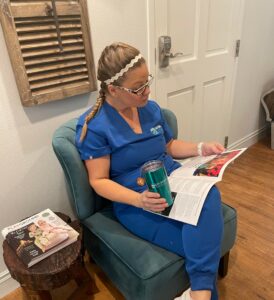Did you know January is National Hot Tea Month? With the weather getting colder—okay, it’s Orlando, let’s say less hot—a nice hot beverage can be just the thing to help you enjoy a cozy moment. But isn’t tea bad for your teeth? What about some of your other favorite hot drinks? Let’s look at some of the oral health benefits and potential pitfalls of a hot cup of tea.
Is National Hot Tea Month a Real Thing?
I’ll admit, I’d never heard of National Hot Tea Month before. Turns out, it started years ago thanks to The Tea Council of the USA! Founded in 1950, the Tea Council’s original purpose was to encourage tea drinking, as well as to link producers and importers in the tea industry in the US and abroad.
However, in recent years their focus has shifted to driving awareness of the health aspects of tea. They facilitate scientific research on teas of all kinds. As a non-profit corporation, it helps to support tea producers in India, Indonesia, Sri Lanka, and more recently Kenya and Malawi. So, in short, yes! National Hot Tea Month is a real thing!
Keep in mind, not all teas are the same. Black tea, green tea, oolong, white tea, puer, and dark. Not to mention all the herbals! Let’s take a look at how they all affect your teeth and gums.
Oral Health Benefits of Hot Tea
Thanks to many years of research, we have a wealth of data-supported knowledge of the many health benefits of tea. From improving cardiovascular health to facilitating weight loss, tea has been proven to help the body in a variety of ways. But did you know some tea is actually good for your teeth and gums, too?
Brewed tea, especially green and black tea, contains naturally occurring Fluoride! Tea plants absorb the mineral from the soil and pass it along to your hot beverage. This essential nutrient fights decay, which we all know is a great help for oral health. They also contain phytochemicals, which have therapeutic antioxidant properties. These antioxidants can reduce the risk of inflammation and infections and may even help lower cancer risk for some people.
In fact, the wound healing traits of tea are very well established. If you have to get a tooth extracted, biting a damp tea bag against the wound site for about 30 minutes can help resolve bleeding! The tannic acid in tea helps constrict blood vessels and promotes the formation of a clot. Keep that tip in mind if you’re getting your wisdom teeth out this summer!
Green tea can help fight bad breath by neutralizing sulfur compounds in the mouth. Black tea actively hinders the formation of plaque on the teeth by disrupting the enzyme that turns sugar into the sticky material plaque uses to stick to the teeth. Some components of tea can fight bacteria associated with periodontal disease. Many herbal teas are also antibacterial and anti-inflammatory properties. There are tons of great oral health benefits to enjoy a nice hot cup of tea.
Can Hot Drinks Harm Your Oral Health?
So, is tea a miracle drink with nothing but great health benefits? Not exactly.
First and foremost, adding sugar or honey to your tea will defeat most of its cavity-fighting potential. So as much as that nice tall glass of sweet tea might sound refreshing, it may actually do more harm than good. If you do prefer a sweet brew, rinse well with water or chew some sugar-free gum afterward.
Black and green tea also contain caffeine, which can be dehydrating. Poor hydration can decrease your saliva in both quantity and quality, so be sure you chase caffeinated beverages with water to compensate.
Most obviously, though, tea stains. In fact, most hygienists I’ve talked to agree that green tea might stain worse than just about anything, including coffee. To prevent stains from tea, brush and floss well before drinking. Stain sticks first to plaque, so the less plaque on your teeth, the less stain you should collect. After enjoying any staining beverages, rinse well with water or chew sugar-free gum. However, don’t feel like you have to brush right away afterward. Tea is slightly acidic, so brushing afterward may damage your teeth.
For patients with restorations like fillings and crowns, keep in mind that temperature changes can be a challenge for your teeth. Nearly all materials expand when heated and contract when cooled, including your teeth as well as those fillings. Amalgam fillings (the silver ones) have the most extreme shifts associated with temperature and may actually crack your teeth over time. So, as you enjoy your nice hot beverage, don’t alternate with iced water between sips. Same goes for soup and salad or any other hot/cold variation. Try to make temperature changes gradual to prevent problems.
While Floridians may not see the same Winter Wonderland as our neighbors to the north, it’s been getting pretty chilly here at night lately! So curl up with a nice hot mug and celebrate National Hot Tea Month! And if you do get some stains, don’t worry; we’ve got your back. Just pop in for your regular cleaning or whitening treatment and we can get your smile glittering again in no time! Keep sipping, Orlando!


